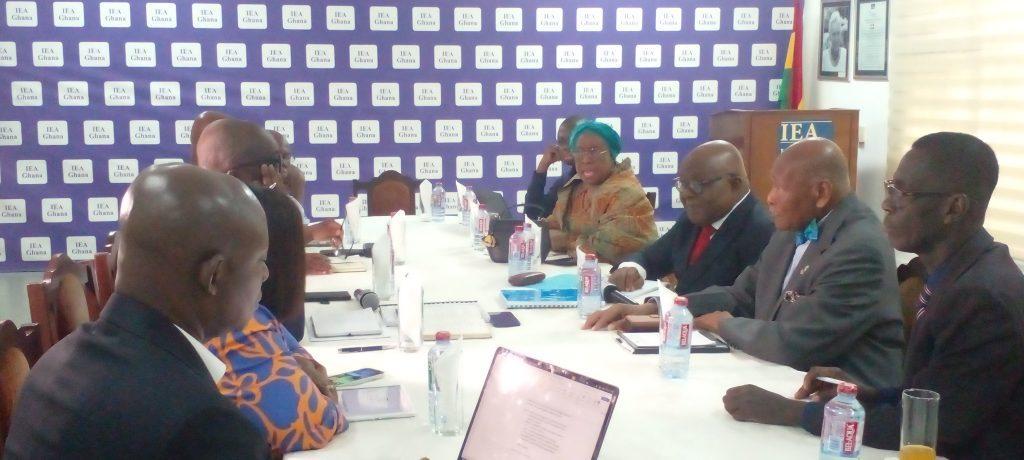Africa-Press – Ghana. The Constitutional Review Committee has intensified national consultation efforts towards soliciting views for constitutional reforms.
The Committee held discussions with some eminent persons who have held critical roles in Ghana’s democratic journey.
Some of the personalities who participated in the discussions were Professor Aaron Mike Oquaye, former Speaker of Parliament, Justice Sophia Abena Boafoa Akuffo, former Chief Justice and Sam Okudzeto, former Council of State member.
Speaking at the sidelines of the engagement in Accra, facilitated by the Institute of Economic Affairs (IEA), Professor H. Kwasi Prempeh, Chairman of the eight-member Constitutional Review Committee, explained the rationale behind the meeting.
He noted that the engagement focused on personalities who had held positions within the constitutional system, and have unique perspectives to share with the Committee.
The engagement bothered on pertinent national issues including the role and relevance of the Council of State, the governance of natural resources, and the sustainability of decentralisation model.
On the Council of State, there was discussion on whether to retain or modify it and consensus seemed to suggest that it should be retained, but its functions and composition must be redefined.
On natural resource governance, the eminent persons raised concerns about the nation’s inability to maximise benefits from its vast natural resource endowments.
They examined the constitutional provision, which vested the ownership of Ghana’s natural resources in the president, and questioned its efficacy.
“There is a sense that Ghana hasn’t gotten enough payoff or return from its natural resource endowment,”Prof. Prempeh observed.
He noted that one of the proposals was that instead of contracts ratification there should be prior approval by Parliament to ensure greater transparency and public scrutiny.
The discussions also delved into the importance of local communities in decision-making processes.
“A lot of people have spoken to us about natural resources and hammered home the point about getting local consent because part of the grievance of local communities is that more often contracts are awarded in Accra, and they come and take our resources without our consent,” he pointed out.
“We are now thinking about benefits sharing and ensuring that local communities have a stake in the natural resources,” he added.
On decentralisation, he said, the engagement revealed a growing consensus that the current model was unsustainable.
“Many of the districts we have created are not viable without central government’s support. The relationship has become one of total dependence,” Prof. Prempeh noted.
While there is broad support for the election of Metropolitan, Municipal, and District Chief Executives (MMDCs), the eminent persons cautioned about practical difficulties due to boundary issues, ethnic and political interests.
“If Accra alone has over 20 districts, are we going to have 20 mayors… Shouldn’t we consider reconsolidating to a reasonable number that is viable?” he queried.
The session forms part of a broader consultation by the Constitutional Review Committee with eminent persons to solicit their input towards constitutiinal reforns.
The Committee has already engaged stakeholders including the business community, organised labour, security agencies, and academia.
The Committee is set to continue series of engagements in the coming weeks to meet more key personalities including Mr. Alban Kingsford Sumana Bagbin, the Speaker of Parliament, Dr. Kwadwo Afari-Gyan, former Electoral Commissioner, and Dr K. B Asante, a former Ghanaian diplomat, who chaired the 1992 Constitutional Assembly.
For More News And Analysis About Ghana Follow Africa-Press







